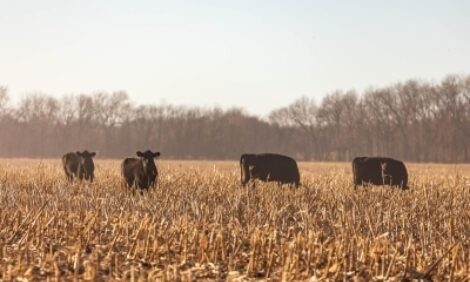



USDA facilitates border crossing of Texas-bred V8 Brahman cattle to Guinea, Africa
Seven high-value Texas-bred V8 Brahman cattle made a 1,500-mile odyssey to their new home range in West Africa thanks to USDA's Foreign Agricultural Service teamOn May 03, 2025, FAS Accra (Post) went into action, resolving an urgent trade issue. With little to no notice over the weekend, Post became aware of the imminent arrival of a consignment of a small herd of seven high-value, reproductive Texas-bred V8 Brahman cattle. The cattle round-up started out in Texas making its way via Chicago to Doha with landfall in Coastal West Africa’s Accra (Ghana).
Post’s expeditious intervention expedited Ghanaian (ECOWAS) import permits and sanitary health clearances, as well as transit authorizations.1 Within 24-hours from their arrival, the Texas-bred V8 Braham cattle were on the road again making their way out of Ghana through neighboring Côte d’Ivoire and up to their destination in Conakry, Guinea – a 1,500-mile odyssey to their new home range.
With information coming in after the close of business, FAS Accra’s immediate action over the weekend was crucial to avert imminent shipment detention of an American livestock export. Post coordinated with its interlocutors at the Ghanaian Revenue Authority (GRA) and the Ministry of Food and Agriculture (MOFA)/Chief Veterinary Officer’s (CVO) office at the Veterinary Services Directorate’s (VSD) Headquarters. Calls were made to contacts to ensure a timely resolution to the impending multi-country trade issue. The U.S.-origin cattle were arriving in the morning of May 5, to Ghana in transit to Guinea without required Ghanaian import documentation.
The Texas-bred V8 Brahman cattle (one bull and six heifers) were airborne and on the move from Chicago to Accra, Ghana. Lacking required import and transit permits, the cattle faced an agonizing stopover at Ghana’s Kotoka International Airport (KIA); that lacks adequate animal handling and quarantine facilities. FAS Accra’s quick thinking and timely intervention facilitated the expeditious processing of import and transit-by-land permits and sanitary health certifications, as well as coordinated an ample feed supply for the cattle just in time for their arrival.
Callout the Cavalry
FAS Accra’s Border Facilitation: FAS Accra’s swift intervention, thanks to on the ground presence, was crucial. It forestalled certain undue stress that awaited the cattle upon their arrival at Accra’s KIA. Ghanaian import regulation requires import permits for live animals transiting Ghana. Without an import permit, shipped animals are seized and an Import without Permit Penalty is levied by the Ghanaian authorities.
Animal detention in Ghana can be stressful for the animals and costly to the shipper. Detention may last at least four days, albeit without appropriate shelter, as the Kotoka International Airport (point-of-entry) lacks adequate animal handling and quarantine facilities. In addition to the Import without Permit Penalty payment, a charge is required for an Official Transitory Note issued by the Veterinary Services Directorate. Moreover, the VSD requires blood samples from detained animals for laboratory testing (with results available only after three days) before granting transit approval. Procedures and clearances were facilitated and expedited thanks to FAS Accra’s intervention.
Ghana to Guinea by Road – A 1,500 Mile Resilience Test for the V8 Brahman Cattle
The Texas-bred V8 Brahman cattle having made their way from Ghana to Côte d’Ivoire crossed over into Guinea on May 15, arriving at their destination at their new home range in Conakry by May 20. The cattle’s resilience throughout this odyssey helps to prove the hardiness of the V8 Brahmans and potential suitableness for exports to tropical West Africa.
Brahman cattle are prized for their heat tolerance, durability, long lifespan, gentle nature, and strong genetics. Females generally exhibit high milk production and good fertility. Their offspring inherit these valuable traits, making them a top choice for breeders. Dairy farmers in the southern United States and parts of South and Central America often use American, Texas-bred Brahman cows to cross traditional dairy breeds for herd improvement.


